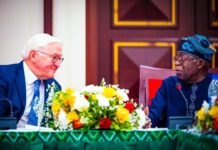South Africa’s ruling African National Congress (ANC) celebrated its 106th anniversary on Monday with a pledge to pursue radical socioeconomic transformation.
The party’s National Spokesperson, Zizi Kodwa, said in a statement in Cape Town that “ANC will fast track land redistribution by creating the legislative framework to pursue expropriation of land without compensation.
“Land redistribution is part of ANC’s transformation programme.”
Kodwa said details about the transformation programme and other programmes would
be contained in a statement to be delivered by newly elected ANC, President Cyril Ramaphosa, during the anniversary celebration.
Celebrations would be held in East London, Eastern Cape Province on Saturday, Dec. 13, 2018, he said.
He added that in celebrating the last 106 years since the ANC was founded on Jan. 8, 1912, “we must never lose sight of the selfless sacrifices of thousands of people, many remain nameless and faceless, who gave their lives for the freedom we enjoy today.
“As the oldest liberation movement on the African continent, the ANC is now more than ever more united and determined to lead the struggle for a united, non-racial, non-sexist, democratic and prosperous society.
“This will, however, be achieved only when we work together to address the persistent challenges of poverty, unemployment and inequality.”
The ANC, he said, had identified: placing the economy on a better trajectory, deepening transformation and consolidating the gains of democracy as four key priorities in its programme of socioeconomic transformation.
Others were to relentlessly fight corruption in all its forms and build unity within the ANC and the country as a whole.
The spokesman said ANC’s 106th anniversary celebration was particularly important as it followed the party’s 54th National Conference held in December 2017.
He noted that at the conference, the ANC recommitted itself to socioeconomic transformation, saying radical socioeconomic transformation had been on the cards of the ANC-led government for years.
But little progress had been achieved as the economy was still dominated by the white minority due to the legacy of apartheid.
Socioeconomic transformation refers to fundamental change in the structure, systems, institutions and patterns of ownership, management and control of the economy in favour of all South Africans, especially the poor, the majority of who are African females.
The government had identified mining, manufacturing, agriculture, energy, tourism and ICT (information, communication and technology) as priority sectors for the participation of black people, who are excluded in the past.
The ANC introduced programmes such as promoting and supporting black industrialists and black small businesses to change the pattern of ownership of the economy. (Xinhua/NAN)



